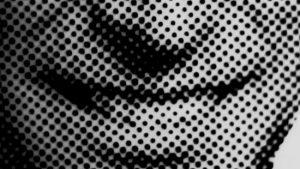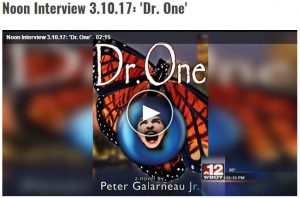Artificial Intelligence
“In an information rich world, a wealth of information creates a poverty of attention—and a need to allocate that attention efficiently.”
– Herbert Simon
Artificial Intelligence Expert & Nobel Prize Winner
“In an information rich world, a wealth of information creates a poverty of attention—and a need to allocate that attention efficiently.”
– Herbert Simon
Artificial Intelligence Expert & Nobel Prize Winner

Your driver’s license photo is becoming a part of your Story across the country.
In a recent article by Fast Company titled “The Vast, Secretive Face Database That Could Instantly ID You In A Crowd,” the use of your photo, a requirement for every vehicle driving citizen in the U.S., is challenging privacy rights. Sound familiar? If you’ve read “Dr. One” it should.
After six months of work and a lot of anticipation, I give you: “Dr. One“, a story about the future ramifications of shared data on the Net.

My new novel explores technology 25 years in the future. The book, itself, incorporates augmented reality on its cover and on the pages inside. I discovered Zappar and its AR technology while writing it last summer and the use of AR and its possibilities is amazing. I was creating my own AR within a single day and it can be seen by pointing any mobile device at the book. The book trailer, posted in my feed below, pops off the cover and hovers. But this is only a small fraction of the capabilities of their tech. I am now exploring 3D 360 possibilities for a…..sequel.
J.J.’s smile was the widest one he’d offered so far. He rubbed his thin-whiskered chin like some aged philosopher.
“A lesson to learn around here is not to assume too much about a person’s intent. Suspicion is what got us all into this mess in the first place. Do you really want to know how he’s feeling? Do you really want to know if he has some hidden desire for her…or for you? Do you really want to throw away humanity’s greatest gift that comes with facing the unknown? What fun or challenge is there in knowing a person’s feelings before you can experience them, judge them on their merits, and make your own conclusions that aren’t based on collated data points? Look at all these people. They all pass each other by, checking each other’s personality metrics to see if anyone they meet is not a pure waste of time. What you’re carrying will, hopefully, help us all understand what we’ve become in the New Cities and to prevent others from succumbing to the same trap. I am concerned about that, but also for you. I don’t need access, nor want access, to your Story. I know you the way your uncle described you, and from what I’ve seen since Kennywood, that’s good enough for me.”
 In many ways, “Dr. One” is a revision to George Orwell’s classic, minus the totalitarian, political dystopian plot that revolves around Big Brother’s desire to rewrite history and create a false world to control the masses.
In many ways, “Dr. One” is a revision to George Orwell’s classic, minus the totalitarian, political dystopian plot that revolves around Big Brother’s desire to rewrite history and create a false world to control the masses.
In “Dr. One,” which takes place in 2041, there is no attempt to revise information by the invisible controlling forces buried in the depths of the Net. Orwell did not see a world so intimately connected, a world in which the idea of content control has been challenged by the millions who have access to create, revise and publish to the masses.
In the 25 years leading up to “Dr. One”, freely giving up personal information, combined with incredibly sophisticated data-mining software, has created a society in which your stored digital life becomes your token for successful living. In “Dr. One”, this is known as your Story.
Control in the future, according to “Dr. One”, is data…about you and the things you love and hate, the friends you claim and their self-reported histories, the places you visit that are recorded by surveillance systems, your ancestry data that either you or someone else has added to the Net, your financial, health, U.S. Citizenry status and so much more. Stop and think, right now, about how much of you is stored for eternal access. Think about the exponential growth this will take in the next 25 years.
In 2041, the idea associated with Big Brother remains but there is no interest in rewriting who you are. Control, is knowing everything about you and then using that information to manipulate the truth.
Perhaps, “Dr. One” can be understood as a prequel to the futures such as are depicted in “1984” or “Gattaca” or “Blade Runner”. It is a vision of a society just before it evolves, dystopian or not, toward the next step in the use of your stored, immediately accessible, digital life.
Mastering the language of storytelling is full of challenge. Besides honing skills in word usage, grammar and pacing, crafting believable characters that live inside believable plots is paramount to achieving an engaging, page-turner.
But the logic built within a novel in particular (because of its length), mimics that which software programs are created. Thinking in algorithms gives a novelist incredible plotting advantage.
The life of a programmer is filled with possibilities. After all, the world pretty much runs on the talents of these individuals. But that’s not the “possibilities” I am referring to, here. I’m talking conditionals. If, then, else statements. While wends. Given X, what are all the possible ways that a person could arrive at Y? And for the program to work, each possible journey toward Y must make sense or the outcome is garbage.
Just like story plots. Characters are the Xs thrust by the writer on paths toward conflict and revelation and change. Like a software algorithm, possible tributaries abound and the author’s mind as the story develops is not so unlike a programmer writing code.
If you create mind maps for your novel plot lines like I do, you’re thinking like a programmer. If one drawn thought bubble suddenly gives birth to lines of connected children all begging for attention and possibility, you’re thinking like a programmer. Not all of the bubble children will live. The if-then conditionals running through your head must eliminate everything that cannot, logically, equal Y.
Have you ever written a software program…even a simple one using the code of the web—HTML? The process can be frustrating, time-consuming, emotionally draining and full of excitement once everything works just the way you’d hoped it would.
Inspiration for my female protagonist, Phoenix Messenger, in the novel “Dr. One”, comes from my decades of experience as a programmer that began so many years ago at Arizona State University. Her code will change the world.
And I am so envious.
One of my bucket list items that remains unchecked is to attend the annual Consumer Electronics Show in Las Vegas. For me, that would equal nirvana, particularly this year since two of my favorite future tech developments are showcasing the events: virtual reality and self-driving cars.
Curiously, I ran across this interview with Oculus VR co-founder Jack McCauley at CES 2017 and it sent a couple of happy chills up the spine. The future of VR, according to McCauley, just might look similar to the future depicted in Dr. One: lightweight, mobile, with networked software intelligent enough to handle the mobile integration of VR at a reasonable cost. (Reasonable meaning those that can afford it vs those who never will nor ever want to).
One thing is for sure: with sales numbers reaching 5 Million Gear VR units so far (and that’s just from Oculus), virtual reality looks to be on solid ground for a future that is sure to give all of us something to think about. It certainly gave me a lot to think about…and write about.
What once seemed improbable now sits ready for launch and the applications that VR will consume will challenge us in ways that, today, are ripe in the minds of science fiction writers.